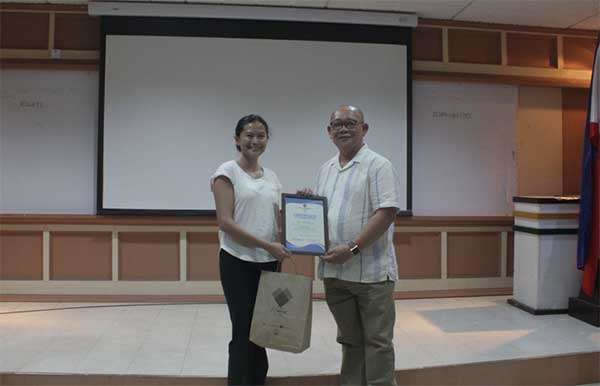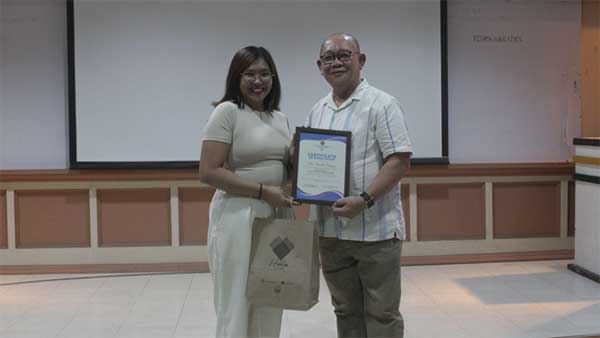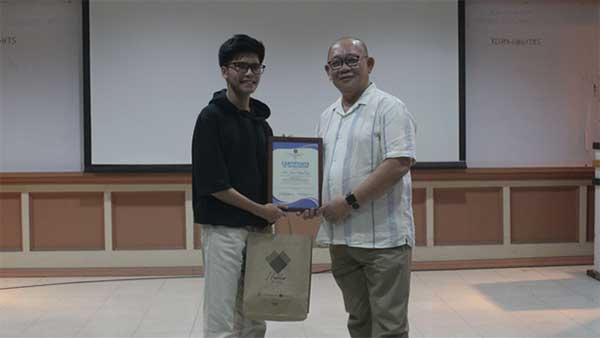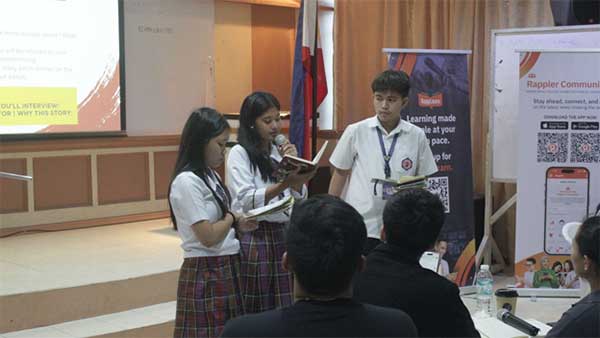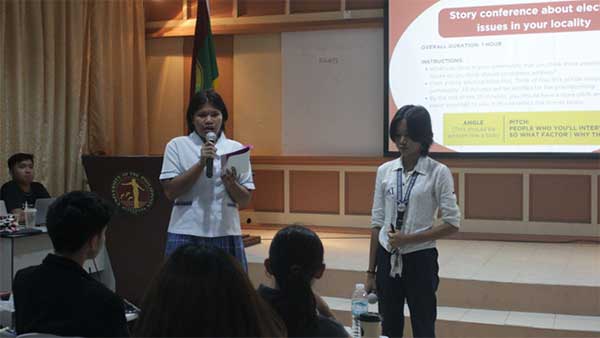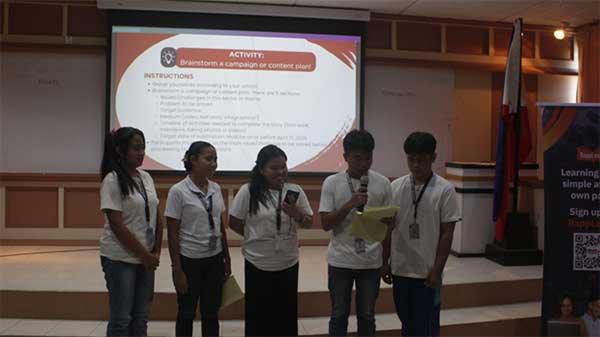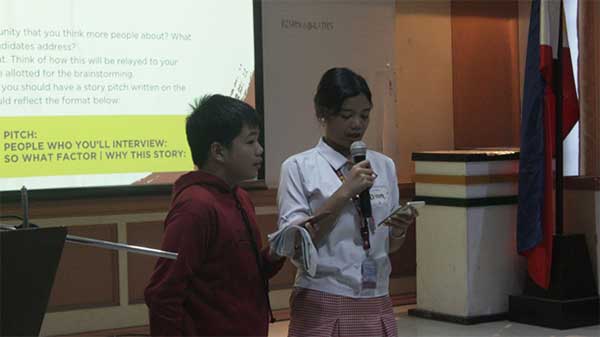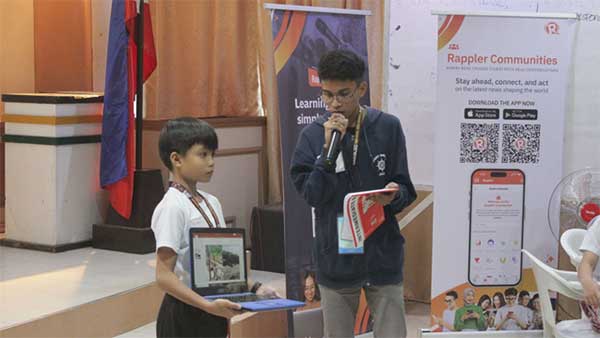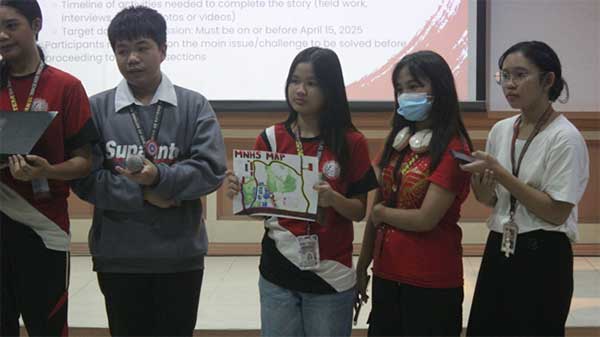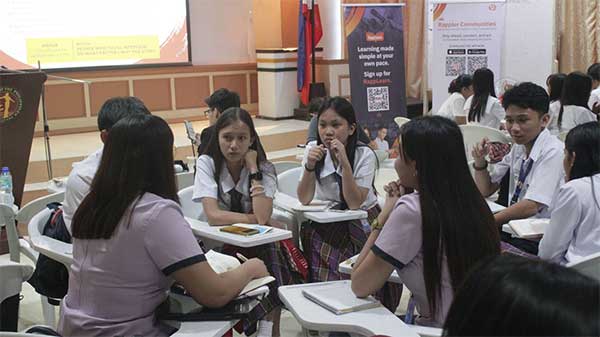
By Ma. Louiela Angela A. Mataac
In pursuit of empowering journalistic voices, invited campus journalists ventured the final tranche of the skill-building initiative and public forum sessions last November 22, 2024 with a triumphant note.
Notable speakers from the Rappler team featured each of their expertise and distinguished perspectives in introducing the journalism community to the participants of the event.
Pia Ranada, Community Lead of Rappler, addressed the inherent challenges on why there is a need to rely on credible sources of information during elections. Known for her news coverages during the reign of Rodrigo Duterte administration tracing back from 2016, she remains to stand at the community frontline to report on international affairs, security, environment, climate change, and disasters. She was accordingly awarded as the 2024 recipient of the Marshall McLuhan Fellowship from the Canadian embassy.
“So itong [workshop] and Rappler’s participation in it, we firmly believe na kailangan nang i-spark yung ganyang interest in young people, na oh we need to care about how our municipality is governed. We need to care about our next leader,” Ranada emphasizes.
Patrick Cruz, on the other hand, who is a groundbreaking writer-researcher for Rappler’s governance cluster, echoes out his discussion session on spot checking dubious content or election violations in news coverages and as a digital citizen. Cruz’s discourse proved his passion about producing data-driven stories concerning local governments and urbanization, analyzing patterns, and trends in data.
Present at the event as well is MJ Catequista, Community Engagement Specialist from Rappler, and one of the moderators of the two-day event along with Czar Ian Esquivel.
Lastly, the event featured the keynote speaker for using social media for the social good, Samantha Bagayas, head civic engagement at Rappler, delivered an inspiring address on the proper usage of social media in covering news elections. Bagayas, credited with her vision, is also part of the MovePH as a civic engagement specialist tackling efforts on environment, gender equality, and disaster risk reduction and management.
“In the digital world, there are so many competitors right now. Even at this point in time, we’re not sure if facts will actually win during the elections,” Bagayas explains.
Collectively tailoring down the realities of the digital landscape during election season and poses an inspiring question on how the youth’s involvement will create an impact in their local spaces.
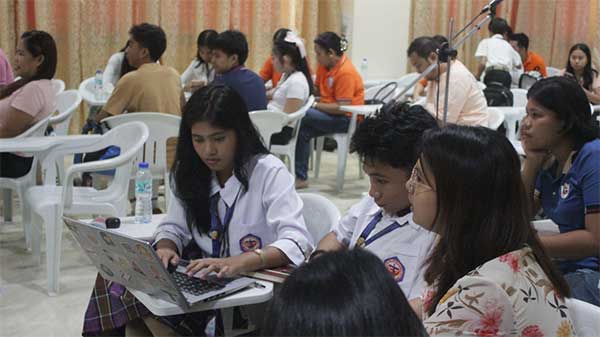
Sparking Empowered Voices
This workshop series was simultaneously attended by representatives from various national high schools of Miagao, Iloilo. Composed of high school and teacher participants from San Rafael National High School, Miagao National High School, Kirayan National High School, Alejandro Firmeza National High School, St. Louise de Marillac School of Miagao, and Bacolod National High School.
Throughout the talks presented on identifying credible sources, fact checking, and analyzing social media, the two-day workshop allowed the students to apply their learnings through pitching localized stories and recognizing community issues.
Several issues talked about the drawbacks of the local government unit, struggles faced in their areas, and functions that limit their capacity as residents of their municipality.
“At the very start, they raised story pitches, but when it came to this [second] session you can actually see how throughout the training that we’ve had and talks that were conducted, their pitches have evolved,” Bagayas says, the session facilitator.
Outlining further that the second-day session gave the invited participants an opportunity to develop their stories, address matters that are being overlooked and discounted in their local community.
“Kagaya sa activity na ginawa po namin. We would like to apply that sa community namin kasi syempre nga po kailangan po namin i execute yung story or idea pitches namin para naman maging aware yung mga politicians or LGU ng community namin,” Ella Lastimoza, Grade 12 student from Kirayan National High School highlights.
Granted the fact that these campus journalists are locals of their own, they set out an advantageous role in covering topics that require immediate action in a localized angle and focused spectrum.
Substantially, Ian Youseff Gencianna, the school publication adviser of Bacolod National High School, cited, “This Tingog Mo, Tingog Ko workshop series on Journalism allowed us to reflect on our work. The learnings na we need not to cover only school events, but we have the power and opportunity to let the community know the things na nangyayari sa society.”
In fact, Gencianna’s claims are tailored down to Angelo’s second-leg community discussion where journalists are emphasized as not merely boxed on campus events but rather as professionals who perform as part of the media and for the community.
On top of that, Bagayas underlined further that the pitches encompassed their motivation to get in touch with their LGUs and seek answers as to why these endeavors and certain difficulties are not being dealt with. Demonstrating that journalists are meant to do more than merely showing up and reporting on events, they are trained to engage communities and raise challenging questions.
Through their active involvement, ideas flowed, motivation sparked, and critical thinkers were generated out of the journalism training conducted.
As what Cruz added, “Mahalaga ang role nila [as journalists] kasi they belong to that community, mas alam nila ying nuances ng mga story.”
Simultaneously, for Gencianna, one way of protecting and being transparent to the people is to resolve issues that encourage engagement, community involvement, and for the communal district to work hand in hand.
The presented experiences, story proposals, and realities of the local landscape showcased that the participants, as campus journalists themselves, illustrated a more prudent way of getting their communities immersed and involved.
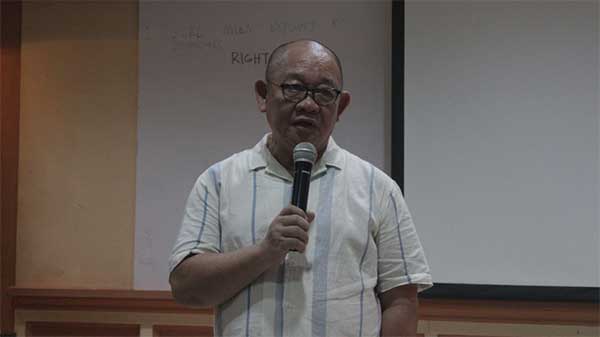
Informed Choices in Community Spaces
This capacity building program demonstrated that voters or non voters, campus journalists are also citizens themselves.
“Whether or not you are a voter, you’re still a citizen, but of course we want you to vote when you become of voting age. But that will happen if we engage you as early as possible, in governance and civic engagement,” Ranada indicates.
Asserting that with the height of disinformation and fake news, it is frolic for informed decisions to start with the youth’s involvement, democratic engagement, and civic participation at a local level.
Tingog Mo, Tingog Ko (TMTK) reinforces the contribution of the younger generation as the target demographic for this competency building campaign and develops upskilling efforts to enrich confidence and knowledge during election season.
“Isa sa mga natutunan ko na pwede kong i-share sa mga kaibigan at pamilya ko ay suriin nila ng mabuti ang mga candidate at politicians na kanilang i-vovote para sa magiging future natin,” Amiel, Grade 7 participant of Bacolod National High School shares.
Entailing that as simple as propagating the knowledge they gained among their social circle could possibly achieve intellectual pursuits within their own community for the upcoming elections.
“A lot of them are not even registered voters yet, but the fact that they came here only shows na they are willing to contribute and amplify their voices and facts to other individuals,” Jasmine Caleza, President of UPV iWrite, adds.
Which reflects that regardless of being a registered voter or not do not necessarily encompass a barrier in learning the ropes of the journalistic community and performing their role as citizens and campus journalists.
The interactive dialogues, workshop sessions, and conversations clearly transcended the efforts and the knowledge of the participants to the first step of becoming an educated voter and active citizen to stay informed.
Bagayas evenly stresses out that crafting educated decisions is one of the communal duties in the next elections and that journalism cultivates efforts and skills to keep the citizens informed and updated on factual happenings.
“Ito yung first step na makita nila na we’re flesh and blood. Seeing us [journalists] as humans, that’s the first step to building trust lalo na’t sobrang vilified ng journalists sa publiko,” Ranada amplifies.
On the occasion that social media in fact takes the form of bodies of information, she emphasized how this capacity building program encapsulated discussions that opened the right set of circumstances for journalists to regain the public trust in a social discourse.
“And now, what we can see when it comes to being relevant is of course to engage with the community and for the community to engage with us,” Bagayas accentuates as her final insight.
On engaging voices of the campus journalists, Francis Allan Angelo, Iloilo Media-Citizen Council (IMCC) Chair, helmed the second appendage of the workshop series last November 16 to 17, 2024 in turn of the first leg enabling voices.
Angelo expanded out dialogues on the rights and responsibilities of campus journalists and writing and reporting issues on local politics for the first day. While proceeding forward to the interactive workshop session on its second day.
His discourse further allowed the participants to rediscover the real essence of the journalistic community from the first and second phase and gear up for the transition on the final sequence of the capacity building program.
Officially culminating the 3-long series of “The Tingog Mo, Tingog Ko: Capacity-building Program on Journalism” on having empowered campus journalists to address the electoral landscape.
“From being enabled, engaged, and now empowered. Express your voice on the right platform and mabuhay kayong lahat,” Zoilo Andrada Jr., the catalyst of journalism initiative and principal mediator of the Tingog Mo, Tingog Ko, closes the program with a heartfelt remark.
By initiating local-centered conversations and in-service journalism training, TMTK successfully fulfilled its three “E” core targets, mainly enabling, engaging, and empowering the voices of the campus journalists.
Akin to the majority, for Gencianna, as a journalist, voter, and member of the community, they affirm that having the TMTK journalism workshop served as a platform that enabled them to initiate their efforts and open community dialogues for the greater good of the public this election season. Proving that now, more than ever, they are campus journalists with empowered voices.
















